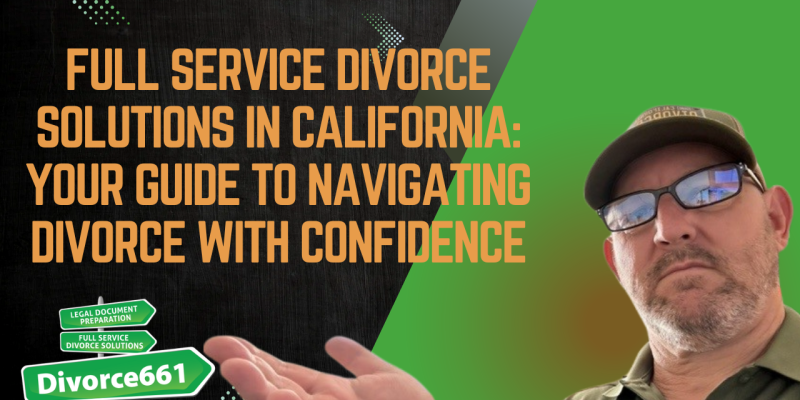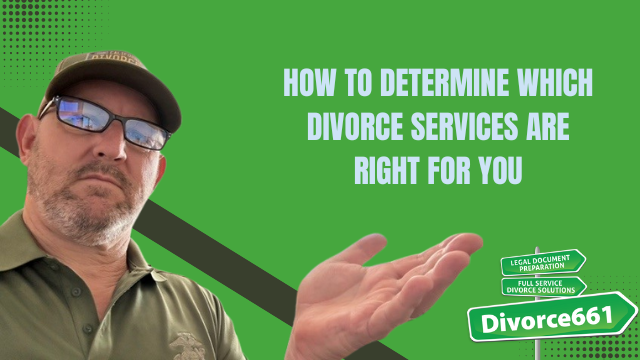Full Service Divorce Solutions in California: Your Guide to Navigating Divorce with Confidence
Divorce is a life-changing event that can feel overwhelming and complex, especially when navigating the legal system on your own. Fortunately, full service divorce solutions exist in California to help individuals and families move through this challenging time with clarity, support, and expert guidance. Drawing from the expertise shared by Tim Blankenship of Divorce661, this comprehensive guide will walk you through the essentials of full service divorce solutions, what to expect, and how to prepare for a smoother transition.
Understanding Full Service Divorce Solutions
When facing a divorce, many people imagine a lengthy and contentious court battle. However, full service divorce solutions aim to simplify the process by providing a range of services designed to meet your unique needs. These services cover everything from legal advice and paperwork preparation to mediation and full representation in court if necessary.
The goal is to offer a one-stop resource that addresses all aspects of divorce, so you don’t have to piece together different services on your own. Whether you and your spouse are amicably parting ways or dealing with more complex conflicts, a full service divorce provider can tailor a plan that fits your situation.
The Benefits of Choosing Full Service Divorce Solutions
Opting for full service divorce solutions in California comes with several advantages that can make a significant difference in your experience:
- Comprehensive Support: From the initial consultation to the final settlement, you receive guidance every step of the way.
- Legal Expertise: Attorneys specialized in family law help ensure your rights are protected and your interests are prioritized.
- Streamlined Process: Coordinated services reduce delays and confusion, making the divorce process more efficient.
- Emotional Relief: Knowing you have professionals handling the legal complexities allows you to focus on healing and planning your future.
- Cost-Effectiveness: Bundled services or packages often save money compared to hiring multiple professionals separately.
Key Components of Full Service Divorce
Full service divorce solutions typically include several essential components that work together to provide a complete resolution:
1. Initial Consultation and Case Evaluation
The process begins with an in-depth consultation where your circumstances, goals, and concerns are discussed. This step is crucial for developing a personalized strategy. During this meeting, your divorce professional will explain how the process works, what to expect, and outline the options available to you.
2. Legal Document Preparation and Filing
One of the most daunting aspects of divorce is managing the paperwork. Full service providers take this burden off your shoulders by preparing and filing all necessary documents with the court. This includes petitions, responses, financial disclosures, custody agreements, and settlement proposals.
3. Mediation and Conflict Resolution
Many full service divorce plans incorporate mediation, a process where a neutral third party helps both spouses negotiate terms amicably. Mediation can save time, reduce conflict, and often leads to better outcomes for both parties, especially when children are involved.
4. Court Representation
If mediation or negotiation fails to resolve all issues, your full service divorce team will represent you in court. Experienced attorneys advocate on your behalf, presenting evidence, arguing for your rights, and ensuring proper legal procedures are followed.
5. Post-Divorce Support
Divorce doesn’t always end when the court issues a final decree. Post-divorce support can include help with modifying agreements, enforcing court orders, and even counseling referrals. Full service providers often offer ongoing assistance to help you adjust to your new life.
Common Questions About Divorce in California
Understanding the divorce process in California is essential to making informed decisions. Here are some frequently asked questions that full service divorce providers address:
How Long Does a Divorce Take in California?
California has a mandatory six-month waiting period from the date the divorce petition is served before it can be finalized. However, the entire process can take longer depending on the complexity of the case, whether children are involved, and if the parties agree on terms.
What Are the Residency Requirements?
To file for divorce in California, either spouse must have been a resident of the state for at least six months and a resident of the county where the divorce is filed for at least three months.
How Is Property Divided?
California is a community property state, meaning that most assets and debts acquired during the marriage are divided equally. Full service divorce professionals help identify, value, and negotiate property division to ensure a fair outcome.
What About Child Custody and Support?
The court prioritizes the best interests of the child when determining custody and visitation arrangements. Child support is calculated based on state guidelines considering both parents’ incomes and the amount of time each spends with the child. Mediation and legal counsel are vital in creating workable parenting plans.
How to Prepare for Your Divorce Journey
Preparation is key to a smoother and less stressful divorce process. Here are some practical steps to take before initiating your divorce:
- Gather Financial Documents: Collect bank statements, tax returns, pay stubs, mortgage documents, retirement account statements, and any records of debts or assets.
- Document Parenting Plans: If you have children, think about a schedule that works best for their stability and well-being.
- Understand Your Rights: Research California divorce laws or consult with a professional to know what to expect.
- Consider Your Support System: Emotional support from friends, family, or counselors can be invaluable during this time.
- Set Realistic Goals: Define what you want to achieve from the divorce, whether it’s a quick resolution, protecting assets, or ensuring fair custody.
Why Work with Tim Blankenship Divorce661
Tim Blankenship and Divorce661 are dedicated to providing full service divorce solutions tailored to the needs of Californians. With a commitment to professionalism and compassionate support, Tim’s approach focuses on simplifying the divorce process and empowering clients to make informed decisions.
By choosing a knowledgeable and experienced divorce professional like Tim, you benefit from:
- Clear communication and transparency throughout your case
- Customized strategies based on your unique circumstances
- Access to mediation and legal representation under one roof
- Support that respects your emotional and financial well-being
Conclusion: Taking the First Step Toward a New Beginning
Divorce can be a daunting chapter, but it also marks the start of a new journey. Full service divorce solutions in California offer a pathway to navigate this transition with confidence and clarity. By leveraging the expertise of professionals like Tim Blankenship of Divorce661, you can protect your interests, reduce conflict, and move forward with peace of mind.
Remember, the key to a successful divorce process lies in preparation, informed decisions, and having the right team by your side. Whether you are just beginning to consider divorce or are already in the midst of proceedings, full service divorce solutions provide the comprehensive support needed to help you through every step.
If you’re ready to explore your options and take control of your divorce journey, don’t hesitate to reach out for a consultation. Your future starts with the right support today.










